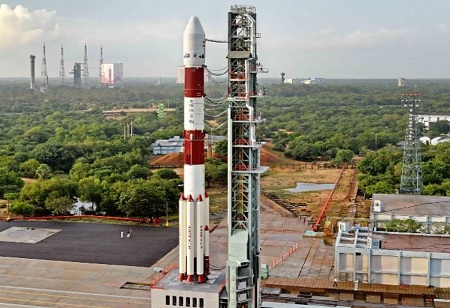
NSIL and Arianespace Enter Agreement for Global Launches Using LVM-3

 NewSpace India Limited (NSIL), a public sector undertaking (PSU) in the Indian space sector, has announced the formalization of a Memorandum of Understanding (MoU) with Arianespace, a prominent French satellite launch company. The objective of this collaboration is to jointly explore opportunities in the expanding global market for commercial satellite launch services.
NewSpace India Limited (NSIL), a public sector undertaking (PSU) in the Indian space sector, has announced the formalization of a Memorandum of Understanding (MoU) with Arianespace, a prominent French satellite launch company. The objective of this collaboration is to jointly explore opportunities in the expanding global market for commercial satellite launch services.
According to NSIL, the partnership entails the collaboration between NSIL's heavy lift LVM3 rocket and Arianespace's Ariane-6 rocket, specifically to address the increasing demand for launching heavy payloads such as communication satellites, earth observation satellites, and satellite constellations.
NSIL, the commercial arm of the Indian Space Research Organisation (ISRO), has entered into a significant collaboration with Arianespace amid the latter's transition away from the Ariane-5 launch vehicle. The move is crucial as Arianespace faces delays in the development of its Ariane-6 rocket. NSIL's assessment of the global launch services market for the next decade underscores substantial growth potential, especially for rockets capable of transporting large payloads to geosynchronous transfer orbit (GTO) and low earth orbit (LEO).
However, the growth projection hinges on India's capacity to scale up LVM-3 rocket production and engage the private sector in these endeavors. This long-term agreement aims to strengthen the positions of NSIL and Arianespace in the competitive commercial launch services industry throughout the 2020s. Both entities are gearing up for increased launch activities to meet the demands of the expanding satellite market, encompassing private communication networks, IoT services, and earth observation constellations.
In a recent development, NSIL expressed its intent to deploy a high-throughput satellite using the SpaceX Falcon 9 rocket later this year. Additionally, NSIL is poised to launch its second demand-responsive communications satellite, GSAT-N2 (formerly GSAT-20), in the second quarter of 2024. Weighing 4,700 kg, GSAT-N2 is designed to provide up to 48 Gbps capacity through 32 beams, covering the entire geographical expanse of India, including the Andaman, Nicobar, and Lakshadweep Islands. This launch marks NSIL's debut use of a US launcher, diverging from its previous reliance on Arianespace for payloads exceeding the capacity of Indian launch vehicles.